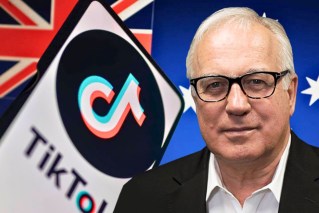Public speaking is facing extinction: Here’s why you should care

Public speaking is under threat of becoming a lost art. Photo: Getty
The sound of a home phone ringing used to trigger a sense of excitement.
Who could it be? Who did they want to speak to? And about what?
Nowadays, a ringtone is unlikely to generate the same degree of enthusiasm or anticipation.
Try to call someone you know today and you’ll likely receive a prompt and confused response via text wondering whether you called by accident.
We live in a world in which we are increasingly accustomed to sharing our thoughts and ideas through screens, messaging, memes and emojis.
But with this shift from talk to text, are we at risk of losing something deeply valuable, the power of verbal communication, and with it, the art of public speaking?
A 2019 report from Deloitte predicts that by the year 2030 two-thirds of jobs in Australia will hinge on soft skills, yet many of these skills – verbal communication among them – are in deficit.
In their 1915 book The Art of Public Speaking, Joseph Esenwein and Dale Carnegie likened those who engage in the public and authentic presentation of thought to poets, novelists and scientists.
Examine the vocabulary of history’s great speeches and that link begins to make sense.
Some of history’s most significant turning points have been marked by a leader’s ability to carry and mobilise their audience through the power of their words.
While our forms of communication have changed, and are changing still, public speaking remains as important as ever, yet it is under threat of becoming a lost art.
Here are three reasons why.
1. More technology has resulted in new ways of communicating
Our world of work is more globally connected than ever before, often embracing larger and more geographically dispersed teams.
Our channels of communication are changing and proliferating, with new ways of communicating disrupting old ones.
Face-to-face conversations and group presentations are giving way to social media platforms and instant messaging, making it easier for people to opt out of public speaking opportunities.
Like learning to speak another language or play a musical instrument, public speaking is a skill you can master, but it needs an investment of time and work.
This investment has become far less appealing when compared with the speed and ease of electronic communication platforms.
2. New ways of communicating offer easier access to information
In roughly the time it takes to read this article, users will have conducted more than 15 million new Google searches globally.
With access to information easier than ever before, people are coming to rely less on experts and educators and more on search engines and social media. Now anyone can contribute to a body of knowledge in any area of expertise.
Sharing your opinion online, you can destroy a reputation or launch a movement.
This surplus of information has contributed to a deficit of attention and made it difficult to deliver a message that cuts through the noise.
Every opportunity to deliver a message becomes a struggle for the attention of the room, and it’s a fight that’s getting harder to win.
3. Easier access to information has resulted in higher expectations
The surplus of information is making it harder to know who we can trust.
Everyone has a voice, yet with so many conflicting views, who or what are we to believe?
The world of fake news and broken promises has created such levels of distrust that it is increasingly difficult to look to leaders with the confidence we once did.
Now we all have greater access to high-quality information, our expectations of those who speak in a public forum continue to rise.
When one of the biggest fears of public speaking is being judged harshly on your content, and comparison is so easy, it’s hardly surprising that people are hesitant to speak out.
While technological advances, universal access to information and high expectations of leaders might tempt you to opt out of public speaking, these risks also present invaluable opportunities.
New mediums of communication have provided a global stage for those who want to share an important message with the world. Easier access to information can drive a commitment to ensure we find a valuable message that cuts through the noise.
Higher expectations can inspire us to advance our knowledge and sharpen our skills.
These changes can be viewed as a risk to undermine the art of speaking in public or as an opportunity to raise it to new levels.
Let’s see it as an opportunity.
This article was first published by Smart Company.








